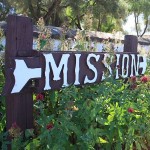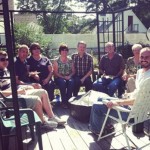We all build, but not in the same way
If you peruse the posts (old and new) on this blog, you’ll find that I write often on the subjects of church gatherings and mutual edification. Why? Well, for one thing, for my PhD dissertation I am studying mutual edification as the purpose of the church gathering together from the perspective of Scripture. For another thing, well, I think the church should all work together to build up one another in maturity in Jesus Christ whenever we meet together. (Which, of course, is why I’m studying that subject for my dissertation…)
Earlier this week, Dave Black wrote a short post that touches on this subject. This is part of his post from Monday, November 14, 2011 at 1:35 p.m.:
Paul made it clear that all of the Colossian believers were to teach and admonish one another (Col. 3:16). The author of Hebrews makes the same point when he writes, “Exhort one another every day” (Heb. 3:13). The message is clear. All Christians are Body-builders (they are to “edify”), but we do not all build in the same way. The New Testament envisages that all Christian disciples will be involved in the “work of the Lord” (1 Cor. 15:58). According to Paul, every member ministry is the normal Christian life.
As he points out, there are many exhortations, principles, and examples in Scripture that indicate that all believers should work together (“mutual”) to build or strengthen the church (“edification”). (By the way, Dave only lists a few of the many passages that point toward mutual edification.)
Similarly, and as he also points out, “we do not all build in the same way.” This is especially clear in the passage of Scripture in which the authors discuss spiritual gifts. But, there are other examples as well.
Think about these two points carefully. There is a reason that we do not all “build” in the same way. We all need to be “built” in different ways. Some may need more of one kind of construction and strengthen than another kind, but we all need many different kinds edification.
We need different kinds of “construction” so we also need different “construction workers.” One person cannot and must not attempt to do all of this work. The body of Christ is not designed to work in this way.
Imagine a dilapidated house… a shack perhaps… about to fall in on itself. It needs much work. It needs carpentry work, electrical work, plumbing work, roofing work, etc. A carpenter cannot do all of the work. An electrician – even a master electrician – cannot do all of the work.
In the same way, in order for the church to be built up (edified), it is necessary for every follower of Jesus to take part in the work of building up.
When you gather with the church, do those gathered understand that the goal is edification of the whole body? Who is expected to do the work of edification? Who is allowed to do the work of edification?
Audience of One?
Have you heard someone say before that Christians always perform for an audience of one? Whether that person is preaching, teaching, singing, dancing, praying, whatever, everything is always done for an audience of one – meaning God, of course.
In a sense, I understand what that means. Obviously, everything that we do can and should be done for the glory of God. However, that does not mean that God is our only “audience.” In fact, there is at least one context where we should NOT act only as if we are alone and acting for God.
What is that context? Whenever we are with other Christians. (There may be other contexts as well, but this is the context that I’m going to examine.)
To begin with, there are several activities that Jesus’ followers often say should be done only for God. For example, some say that good deeds or works of righteousness should only be done for God (and some would say that only God should know about these activities). Of course, this is one possible interpretation of Matthew 6:1-4. However, this interpretation fails to take into account those times when we are specifically instructed to do good deeds in a manner that others see and recognize those actions for what they are. For a few examples, see Matthew 5:13-16 or the many passages in which one of the authors of Scripture offer their own good deeds as an example for others to follow or in which we are exhorted to live in a manner that others can see our good deeds as well.
Often, fasting as presenting as an activity that should be done for an audience of one. Again, there is a particular passage that can be interpreted to mean that we should never let others know that we are fasting: Matthew 6:16-18. However, we know about every fast in Scripture (i.e., the fasts are not “secret”), and we even have several examples of group fasts in which the group obviously knew that the others were fasting. (For example, see Acts 13:2-3 and Acts 14:23.)
But, there is a passage of Scripture in which believers are specifically instructed NOT to do things only for an audience of one – i.e., things should not be done only for God. This passage, of course, is 1 Corinthians 14. After explaining that people do not generally understand what is spoken through tongues (without interpretation), Paul says:
Therefore, one who speaks in a tongue should pray for the power to interpret. For if I pray in a tongue, my spirit prays but my mind is unfruitful. What am I to do? I will pray with my spirit, but I will pray with my mind also; I will sing praise with my spirit, but I will sing with my mind also. Otherwise, if you give thanks with your spirit, how can anyone in the position of an outsider say “Amen” to your thanksgiving when he does not know what you are saying? For you may be giving thanks well enough, but the other person is not being built up. I thank God that I speak in tongues more than all of you. Nevertheless, in church I would rather speak five words with my mind in order to instruct others, than ten thousand words in a tongue. (1 Corinthians 14:13-19 ESV)
Similarly, when specifically giving instructions to those who have been given a tongue (by the Holy Spirit), Paul writes:
If any speak in a tongue, let there be only two or at most three, and each in turn, and let someone interpret. But if there is no one to interpret, let each of them keep silent in church and speak to himself and to God. (1 Corinthians 14:27-28 ESV)
Paul does not deny that the tongue is a gift of the Spirit. Nor does he ever deny that the tongue can be beneficial to the one speaking it. He never says that God does not desire for the person to exercise that gift (tongues). However, Paul consistently states the same admonition: When gathered with the church (i.e., other Christians) always and only do and say things that will benefit the group. Thus, God is not our only audience. We must be concerned with what others will understand and how our words and/or actions will benefit them (i.e. for edification).
It is perhaps surprising that Paul even includes prayer in these instructions. If others cannot understand your prayer, then Paul says it should not be spoken (even if it is spoken directly to God). Why? Because we are speaking both to God and for the benefit of others (i.e., for their edification). Even prayer.
Of course, if you read any of Paul’s letters, you will see that he almost always included a prayer. Why would he write out a prayer if it was only for God? Because it was not only for God; it was also for the encouragement of his readers.
Yes, everything we do should be done for the glory of God. We should do everything recognizing that God is our audience. But, when we are with other believers, God is not our ONLY audience. We should also keep the others around us in mind, and do everything for their edification as well.
Discernment when Scripture doesn’t Answer our Questions
As I said in a previous post, I’m working my way through a series on the role of discernment when the church gathers together. (See the “Introduction” post here.) I’ve also stated already that I believe that discernment is the work of those who are gifted at “distinguishing between spirits,” but it is also the work of those who are not gifted in that way. Similarly, I pointed out that discernment is part of the edifying process that occurs while the church gathers together. I pointed out a couple of examples in which people used Scripture to help them weigh what was being said.
While it’s popular to state that Scripture answers all questions, Scripture itself never makes that claim. In fact, there are a few examples of people discerning what God wants them to do when Scripture does not answer the question. I’ll cover two of those examples in this post.
The first example is found in Acts 16 during Paul’s travels with his team on what is typically called his second missionary journey:
And they went through the region of Phrygia and Galatia, having been forbidden by the Holy Spirit to speak the word in Asia. And when they had come up to Mysia, they attempted to go into Bithynia, but the Spirit of Jesus did not allow them. So, passing by Mysia, they went down to Troas. And a vision appeared to Paul in the night: a man of Macedonia was standing there, urging him and saying, “Come over to Macedonia and help us.” And when Paul had seen the vision, immediately we sought to go on into Macedonia, concluding that God had called us to preach the gospel to them. (Acts 16:6-10 ESV)
Previously, Paul had decided to visit the believers in the cities where he and Barnabas had traveled. Once he got to Antioch of Pisidia, he decided to continue. He first tried to go into the region of Asia, then they attempted to go to Bithynia. Finally, they went Troas. There, they not only met Luke (apparently), but Paul had a dream of someone from Macedonia asking for help. Luke tells us that the group concluded that God wanted them to go to Macedonia to proclaim the gospel.
So, when Paul and his team was trying to decide where to go next, they could not turn to Scripture. There was no passage in the Old Testament that would tell them what city or region to travel to. Instead, they apparently used their own reason or desires until God stopped their progress or directly communicated with them. Even when he directly communicated with Paul through a dream, it appears that Paul shared the dream with the group so that they could all weigh their response. (Note: The participle “concluding” does not necessarily point to a long, drawn out debate, but it does point to the potential for deciding one way or the other.)
The next example is even more intriguing (at least to me). Later in Paul’s journeys, he decides that God wants him to go to Jerusalem. In fact, he feels that the Holy Spirit has him in chains and is pulling him to Jerusalem. (See Acts 20:22.) When his team sails across the Mediterranean and reaches Caesarea, the are approached by a prophet:
While we were staying for many days, a prophet named Agabus came down from Judea. And coming to us, he took Paul’s belt and bound his own feet and hands and said, “Thus says the Holy Spirit, ‘This is how the Jews at Jerusalem will bind the man who owns this belt and deliver him into the hands of the Gentiles.'” When we heard this, we and the people there urged him not to go up to Jerusalem. Then Paul answered, “What are you doing, weeping and breaking my heart? For I am ready not only to be imprisoned but even to die in Jerusalem for the name of the Lord Jesus.” And since he would not be persuaded, we ceased and said, “Let the will of the Lord be done.” After these days we got ready and went up to Jerusalem. (Acts 21:10-15 ESV)
This passage is intriguing to me because the prophet Agabus accurately communicated what eventually happens to Paul. (So, this was not only an instance of prophecy, but also of foretelling the future.) However, there was disagreement concerning what they should do with this information. Paul knew that God wanted him to go to Jerusalem. The people with him thought the prophecy meant that Paul should not go to Jerusalem. Again, this is not a question that is answered in Scripture.
In these cases we get a better view of what is included in “discernment.” Discernment not only refers to determining what something means, but it also refers to determining how it may or may not apply. Something could apply to no one, to an individual, to a sub-group, or to the entire group. This is all part of discernment.
Does it concern you that we must often discern (“weigh”) questions that are not answered by Scripture? What other means do we have to discern different types of questions or speech or activities?
—————————————
Series on Discernment
Prelude: Let the Others Weigh what is Said…
1. Test Everything: The role of discernment when the church gathers (Introduction)
2. Discernment: A gift of the Spirit and the work of all
3. Discernment: Part of the edifying process of the church gathering
4. Discernment, the Bereans, and Scripture
5. Discernment when Scripture doesn’t Answer our Questions
Edification and Mission Again
Eric at “A Pilgrim’s Progress” has written a very good post called “Edification Necessarily Leads to Mission.”
His post reminds me of a post I wrote a few months ago called “Which is important for the church: edification or mission?”
Edification, as part of the process of helping people follow Jesus, should lead to many things, including (as Eric says) proclaiming the good news of Jesus Christ to others.
Eric writes:
If edification has its intended outcome, we will all mature in Christ. Part of that maturation is desiring for others to know the Jesus who is transforming us. As Christian maturity goes up, a desire for others to come to Christ ought to naturally rise as well.
The author of Hebrews tells us in 10:24, “And let us consider how to stir up one another to love and good works.” Edification leads directly to love and good works. What more loving work can there be than proclaiming the life-giving news of Christ crucified and resurrected?
I think the intended outcome of edification is a group of people who are maturing in Jesus Christ. Maturity will certainly include a propensity toward proclaiming the gospel of Jesus Christ.
What do you think?
Discernment, the Bereans, and Scripture
As I said in a previous post, I’m working my way through a series on the role of discernment when the church gathers together. (See the “Introduction” post here.) I’ve also stated already that I believe that discernment is the work of those who are gifted at “distinguishing between spirits,” but it is also the work of those who are not gifted in that way. Similarly, I pointed out that discernment is part of the edifying process that occurs while the church gathers together.
For the last two posts in this series, I want to highlight a couple of examples of discernment that we find in Scripture. The first example is found in Acts 17:
The brothers immediately sent Paul and Silas away by night to Berea, and when they arrived they went into the Jewish synagogue. Now these Jews were more noble than those in Thessalonica; they received the word with all eagerness, examining the Scriptures daily to see if these things were so. Many of them therefore believed, with not a few Greek women of high standing as well as men. (Acts 17:10-12 ESV)
In this case, the Bereans were not judging “prophecy” in the sense that we read about in 1 Corinthians 14. Instead, they were discerning the good news that Paul and Silas was proclaiming in the synagogue. The “received” the message that Paul and Silas spoke, then checked it against what they read in Scripture. Some of those who weighed this message “believed,” while, apparently, some did not believe.
If we remember that at this time the Jews in Berea would not have owned a personal copy of the Scriptures, we can get a better idea what was happening. Obviously, they would have had to gather together in order to “examine” Scripture and compare that to the message proclaimed by Paul and Silas.
Similarly, we should not forget that Luke tells us that this examination happened “daily.” This was not a once-per-week synagogue service, but a daily gathering in order to check the verity of the good news concerning Jesus Christ. (By the way, this kind of daily gathering is more in line with other historical accounts that shows the synagogue as more of a gathering for community and social activities.)
In a similar incident, when believers gathered together in Jerusalem and discussed whether or not it was valid to teach that Gentiles must be circumcised and keep the law in order to be saved (Acts 15:6-21), Luke lists several methods of discernment. James, for example, turns to Scripture, like the Bereans mentioned above. Luke writes:
After they finished speaking, James replied, “Brothers, listen to me. Simeon has related how God first visited the Gentiles, to take from them a people for his name. And with this the words of the prophets agree, just as it is written, ‘After this I will return,and I will rebuild the tent of David that has fallen;I will rebuild its ruins, and I will restore it, that the remnant of mankind may seek the Lord, and all the Gentiles who are called by my name, says the Lord, who makes these things known from of old.’ Therefore my judgment is that we should not trouble those of the Gentiles who turn to God… (Acts 15:13-19 ESV)
James remarks that Simeon’s (Peter’s) experience matches up with what he had read in “the Prophets” (part of the Hebrew Scriptures).
Thus, in these two examples, we see people turning to Scripture to help them in discernment. (Of course, in both of those examples, the people were turning to the Old Testament Scriptures.) This does not mean, however, that Scripture always has all of the answers that we need in discernment. In the next post, we look at other examples where believers do not rely on Scripture to help them discern what God is telling them.
What are some of the benefits of using Scripture to help us discern what God is communicating with us? What are some dangers of using Scripture?
—————————————
Series on Discernment
Prelude: Let the Others Weigh what is Said…
1. Test Everything: The role of discernment when the church gathers (Introduction)
2. Discernment: A gift of the Spirit and the work of all
3. Discernment: Part of the edifying process of the church gathering
4. Discernment, the Bereans, and Scripture
5. Discernment when Scripture doesn’t Answer our Questions
Discernment: Part of the edifying process of the church gathering
As I said in a previous post, I’m working my way through a series on the role of discernment when the church gathers together. (See the “Introduction” post here.) I’ve also stated already that I believe that discernment is the work of those who are gifted at “distinguishing between spirits,” but it is also the work of those who are not gifted in that way.
In this post I want to point out something that I’ve assumed several times already: discernment is part of the edifying process that occurs while the church gathers together. That would also mean that discernment is a mutual process, meaning that the whole church is involved in the work.
As I said in the previous post, Paul includes “discernment” (“the ability to distinguish spirits”) among the examples of the many ways that the Holy Spirit manifests himself in his children for the benefit of all. (See 1 Corinthians 12:10.) However, it is important to note that Paul also includes “discernment” (“weigh what is said”) specifically in the principles that he lays out for meeting together in a way that allows the church to work together to build up one another:
What then, brothers? When you come together, each one has a hymn, a lesson, a revelation, a tongue, or an interpretation. Let all things be done for building up… Let two or three prophets speak, and let the others weigh what is said. (1 Corinthians 14:26-29 ESV)
So, the context of this passage is coming together as brothers and sisters in Christ, and Paul begins by stating (emphatically) that everything done should build up others (not only the one speaking). He also specifies that several should be allowed to exercise each type of speaking (one at a time, of course).
In the midst of these instructions about meeting together, Paul includes discernment, saying, “[L]et the others weigh what is said,” referring specifically to what prophets say, in this case. For Paul, these instructions about discernment fall within the realm of the church gathering and fall within the process of building up one another.
Don’t miss the significance of this: discernment is both part of gathering together as the church and also part of mutual edification.
In another letter to the church in another city, Paul again included discernment within the context of the work of edification by the whole church:
Therefore encourage one another and build one another up, just as you are doing. We ask you, brothers, to respect those who labor among you and are over you in the Lord and admonish you, and to esteem them very highly in love because of their work. Be at peace among yourselves. And we urge you, brothers, admonish the idle, encourage the fainthearted, help the weak, be patient with them all. See that no one repays anyone evil for evil, but always seek to do good to one another and to everyone. Rejoice always, pray without ceasing, give thanks in all circumstances; for this is the will of God in Christ Jesus for you. Do not quench the Spirit. Do not despise prophecies, but test everything; hold fast what is good. Abstain from every form of evil. (1 Thessalonians 5:11-22 ESV)
While this passage from Paul’s letter to the Thessalonian Christians is not limited to times when the church gathers together, it does seem to include those times as well. Again, the focus is on encouraging and building up one another, and both listening to prophecies as well as discernment (“test everything”) is part of that edification.
This last passage will lead us to the final two passage in this series. In 1 Thessalonians 5:21-22, Paul wrote in stoccato fashion: Test everything. Host fast to what is good. Abstain from every kind of evil. In many ways, this helps us understand what the work and role of discernment is when we gather together.
Have you ever gathered together with other Christians in a way that included the work of discernment? Would you share something about that with us?
—————————————
Series on Discernment
Prelude: Let the Others Weigh what is Said…
1. Test Everything: The role of discernment when the church gathers (Introduction)
2. Discernment: A gift of the Spirit and the work of all
3. Discernment: Part of the edifying process of the church gathering
4. Discernment, the Bereans, and Scripture
5. Discernment when Scripture doesn’t Answer our Questions
Discernment: A gift of the Spirit and the work of all
As I mentioned in yesterday’s post, I’m working my way through a series on the role of discernment when the church gathers together. (See the “Introduction” post here.)
I struggled with how to being this series… or, actually, I guess I should say that I struggled with how to continue this series. I’m going to study several passages, and I could have begun with any of those passages. However, I decided to continue where I started in the introduction: from Paul’s teaching on spiritual gifts in his letter to the Corinthians.
In 1 Corinthians 12:8-10, Paul lists several types of ways that the Holy Spirit gifts individuals to help the church:
For to one is given through the Spirit the utterance of wisdom, and to another the utterance of knowledge according to the same Spirit, to another faith by the same Spirit, to another gifts of healing by the one Spirit, to another the working of miracles, to another prophecy, to another the ability to distinguish between spirits, to another various kinds of tongues, to another the interpretation of tongues. (1 Corinthians 12:8-10 ESV)
As you can tell, Paul is focusing on the fact that the same Spirit is giving these different gifts. The variety in the giftings does not detract from the singularity of the source (i.e., the Holy Spirit). And, if you started reading a little earlier, you would have found that there is also a singularity of purpose: for the common benefit (or, as Paul would say later, for building up the church). (1 Corinthians 12:7)
In this list, “discernment” is called “the ability to distinguish between spirits,” or, literally, “the differentiation of spirits.” Paul uses the verb form of “differentiation” (“discernment” or “ability to distinguish between”) in 1 Corinthians 14:29 in the context of prophecy and “weighing” what prophets said. (I mentioned that passage briefly in the introduction post.)
Thus, “discernment” is a gift of the Spirit, along with prophecy, teaching, apostle, etc. As Paul insinuates later, all are not gifted with “discernment,” just as all are not gifted as apostles, teachers, prophets, etc. So, some are divinely empowered to do whatever it is that I am calling “discernment.”
However, as we see with the other spiritual gifts, the activities described by the “spiritual giftings” are not limited to those with the gifts themselves. Thus, while only some are “gifted” as teachers, all believers are instructed to teach each other. Similarly, while only some are “gifted” as exhorters, all believers are instructed to encourage one another. (I think we also see that all believers have the ability to prophesy in 1 Corinthians 14:31.)
So, I would say the same thing applies to discernment. Some are divinely gifted to discern “between spirits.” However, all are to do this work. (By the way, if Ephesians 4:11-12 is not limited to the gifted individuals there, then those gifted at discernment should be equipping others to do the work of discernment as they all serve the church.)
Putting this all together, we see that both those gifted at discernment and those who are not gifted as discernment are to do the work of “distinguishing between spirits.” I think that every follower of Jesus Christ would be included in one of those two groups. So, when we are gathered together, we should all seek to discern what is said.
[This is a side note – although related. It really shouldn’t have to be said, but it does. There is nothing in this passage (1 Corinthians 12-14) or any other passage to limit the work of discernment when the church gathers to only those who view themselves as leaders or are viewed by others as leaders (pastors, elders, bishops, deacons, etc.). Of course, there is also nothing in this passage or any other passage to limit any type of speaking when the church gathers to leaders.]
But, what does it mean to discern what is said? And, what type of speech should be discerned? Is discernment only for prophecy? Should teaching/preaching be discerned?
In the next couple of posts, I’ll examine some passages that will help us answer those questions.
—————————————
Series on Discernment
Prelude: Let the Others Weigh what is Said…
1. Test Everything: The role of discernment when the church gathers (Introduction)
2. Discernment: A gift of the Spirit and the work of all
3. Discernment: Part of the edifying process of the church gathering
4. Discernment, the Bereans, and Scripture
5. Discernment when Scripture doesn’t Answer our Questions
Test Everything: The role of discernment when the church gathers
In 1 Corinthians 12, Paul begins a long (3 chapters) section of the letter addressing spiritual gifts. In the first part (chapter 12), Paul focuses mainly on the variety types of gifts and the importance of all the gifts working together for the benefit of the whole church. In the next part (chapter 13), he tells his readers that demonstrating love is more important than exercising any kind of gift. (In a rhetorical exclamation, he announced that even exercising great faith is nothing if the person is not showing the love of God to others.)
Finally, in the last section of this teaching about spiritual gifts, Paul turns more toward the use and exercise of the various gifts when the church gathers together. Since he primarily discusses the gifts of prophecy and tongues, some believe that the Corinthian church struggled with those two gifts. This is possible; perhaps probable.
But, while correcting the way that the Corinthians were practicing or emphasizing spiritual gifts, Paul gives them (and us) a key principle: everything that is said or done when we are gathered with other Christians should edify those others. In fact, the only reason (according to Paul) that prophecy is preferred to tongues (uninterpreted) when the church is gathered together is that prophecy directly edifies the church while speaking in tongues does not.
When Paul comes around to laying down some general guidelines for speaking when gathered with other believers (1 Corinthians 14:26-40), he again divides his instructions into two parts: one set of instructions for speaking in tongues and another set of instructions for prophesying. Among the instructions for prophesying, Paul adds the importance of “discernment”: Let two or three prophets speak, and let the others weigh what is said. (1 Corinthians 14:29 ESV)
So, while Paul believes that prophesy directly edifies the church, he also says that prophesy should be weighed. He says something similar when writing to the church in Thessalonica: “Do not despise(AD) prophecies, but test everything; hold fast what is good. Abstain from every form of evil.” (1 Thessalonians 5:20-22 ESV)
This discernment (or judging/weighing) becomes even more important when we think about other forms of speaking when the church gathers together. For example, I would think that teaching is directly edifying also (like prophesying). Thus, teaching would fall under the same guidelines as prophecy, and any type of instruction should be judged also. The same would be true of other types of speaking such as encouragement or even admonishment.
But, what does it mean to “weigh” what someone says? What is discernment? Who should judge what is said and for what reason? What examples of discernment do we find in Scripture? I hope to examine each of these questions in the next few posts.
But, let’s be honest. For the majority of Christians who gather together (at least in the Western world), discernment is not and cannot be part of their gatherings. Usually, only one person speaks. If someone else speaks, that person must first be given permission to speak. Then, if someone has a question about what is said, or if someone disagrees, there are few avenues of asking questions, much less discernment. (Yes, I understand that some “preachers” or teachers allow for questions and disagreements. But, for most Christians in America and the west, this is not allowed or encouraged.)
In spite of this, discernment was important to Paul. Plus, this is a topic that I have not studied much. So, I’m looking forward to looking at various passages of Scripture that I think are related to this topic.
What passages would you study in order to understand discernment? Do you think everything said among the church should be “judged”? Why or why not? When something is spoken, what about that should be “weighed” by others?
—————————————
Series on Discernment
Prelude: Let the Others Weigh what is Said…
1. Test Everything: The role of discernment when the church gathers (Introduction)
2. Discernment: A gift of the Spirit and the work of all
3. Discernment: Part of the edifying process of the church gathering
4. Discernment, the Bereans, and Scripture
5. Discernment when Scripture doesn’t Answer our Questions
Building up the body of Christ… together
I love Philippians 2:1-4 and Ephesians 4:11-16. Both passages are so rich and challenging when it comes to our life together as children of God. So, I was excited to see that Bobby at “Deconstructing Neverland” referred to both passages in his post “I’m a dreamer.”
In his post, Bobby is encouraging believers to gather together in a way that allows the whole church to work together to help one another grow in maturity in Jesus Christ. God has equipped and gifted all of his children for this work, and it will not take place if only one or two are serving everyone else.
Bobby shares these thoughts concerning a discussion he and another brother had about Philippians 2:1-4:
In two hours of discussion we couldn’t move past these verses. We were locked in to sharing all the riches that are ours in Christ and how those riches empower us to follow Paul’s exhortation to the church in Phillipi. For the first time ever when reading this passage I could see God’s purpose in building the church very clearly. That purpose is for all of the redeemed to be built up into Christ. So we are to have the same mind, same passion, and with the same goal to build others up into Christ. Can you imagine how buff Christ’s body would be if every member had this mind and goal? We cannot even begin to imagine the impact God’s kingdom would have if every believer everywhere was devoted to building others up in Christ.
He asks, “Can you imagine how buff Christ’s body would be?” Isn’t that an awesome questions?
The entire post is excellent, and you definitely don’t want to miss the last paragraph. He makes a great distinction between “tweaking” existing programs/activities and the type of gatherings that he’s talking about. You can read my comment there as well.
By the way, Bobby, you may be a dreamer… but you’re not the only one.
Members together with one another
For the last few days (and for the next few days), our family and some friends are in Williamsburg, VA. This morning we gathered together with some brothers and sisters in Williamsburg.
I’ve known Danny for a few years. Last year, he and I even traveled to Ethiopia together with Dave Black. About a month after we returned from Ethiopia, Danny moved back to Williamsburg. One of the reasons that we came to Williamsburg was to spend time with Danny and his family and some of the brothers and sisters in Christ that he had met.
This morning we had a chance to get together with them. We sang together, prayed together, read Scripture together, and encouraged and edified one another together. We shared the bread and cup together and ate salad, spaghetti, and sausage and peppers together. We sat around outside and enjoyed the fall afternoon and continued our conversations and fellowship.
Even though we live in North Carolina and they live in Virginia, we immediately recognized ourselves as and spent time together as members together with one another. Members of what? Members of some man-made designation of “local church” with whatever name we might give it? No. Co-members of the church – the body of Christ – not through some distinction or decision of man, but because we are all children of God and therefore brothers and sisters to one another.
What a great day so far! I thank God for the brothers and sisters (the church) that we gathered with this morning. Some of them I knew; some I had never met before. But, we were all members together with one another.










